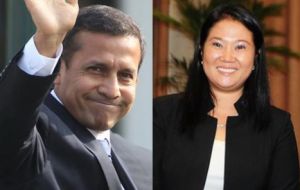MercoPress. South Atlantic News Agency
Humala or Keiko, they will have to work hard for parliamentary support
 One of them will be the next Peruvian president June 5
One of them will be the next Peruvian president June 5 Whatever happens next June 5 when the Peruvian presidential run-off between Ollanta Humala and Keiko Fujimori, none of them will have a clear support in the 130 seats Congress which will force alliances as has been the recent legislative history of the Andean country.
Ollanta Humala who won the first round with 31.6% of votes cast will have 46 members in Congress while Keiko Fujimori, with 23.5% totalled 36. This means that the rest of lawmakers can make up a block which in reality could become the ‘first minority’ according to Renzo Reggiardo a re-elected member from the opposition.
“If we join forces with members from Peru Posible and Alianza por el Gran Cambio (third and fourth groups in the election) we can become a counter block with 45/46 members, a first minority which is what the Peruvian electorate needs given the two possible candidates”, added Reggiardo.
Rather ironically he remarked that Humala must convince voters he won’t rule with Venezuela’s Hugo Chavez in the backstage, and Keiko that her imprisoned father and former president (still with strong support) or his former advisors will not have the upper hand if the daughter is finally victorious next June 5.
“I think this is a congressional issue of the most significance and lawmakers must be ready to reach an understanding on the creation of what I have called a ‘concerted democratic block’ to counter any non-institutional extravagances which we could face in the future given the records of the candidates”, underlined Reggiardo.
Humala a former ultra nationalist Army officer, allegedly involved in human rights abuses during the combat against Maoist guerrillas in the eighties and nineties, is accused of having close links with Venezuela’s Chavez although this time (in 2006 he lost to President Alan Garcia) he has a more mild pro business speech, supposedly with advisors from Brazil’s ruling Workers Party.
Keiko, 36, runs on the attraction her father Alberto Fujimori who ruled for almost ten years but fled the country on a rigged third re-election attempt and now is jailed on corruption and human rights violations charges. However he defeated the Shinning Path Maoist guerrilla movement and opened the Peruvian economy to foreign investment setting the foundations for the current strong performance.
The objective of such a large block in Congress is not to obstruct the new government but rather to guarantee democratic and economic rights, including human rights pointed out lawmaker Luis Galarreta.
During the last decade Peruvian presidents Alejandro Toledo and Alan Garcia managed to rule in spite of lacking clear majorities in congress, but they did not face big blocks and had sufficient margin to create the necessary majorities on specific issues.
The new congress that takes office next July 28, Peruvian Independence Day will have formally representatives from six political parties, although because of the minimum representation regulation, for electoral reasons and not extensive to legislative work, the fact is that there are at least 14 political groupings according to Peruvian political analyst, Fernando Tuesta Soldevilla.




Top Comments
Disclaimer & comment rulesCommenting for this story is now closed.
If you have a Facebook account, become a fan and comment on our Facebook Page!